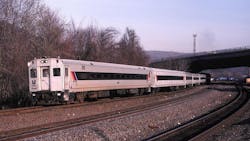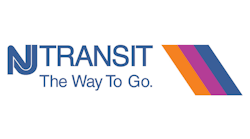NJ Transit to begin public hearing process on fare increase proposal
New Jersey Transit (NJ Transit) is set to begin the public hearing process on its proposal to increase fares for the first time in nine years to offset the budget gap in the Fiscal Year 2025 (FY25) budget. The proposal would increase the current fare rate to 15 percent.
Since the onset of the COVID-19 pandemic, NJ Transit ridership has returned to approximately 80 percent of pre-COVID levels, with many peak period trips at or exceeding pre-pandemic levels. However, the agency notes it is entering the fifth consecutive year of ridership that will be below pre-COVID levels, which has resulted in a reduction of nearly $2 billion in farebox revenue for the agency. NJ Transit used federal COVID-19 relief funding during a multi-year period to maintain full service levels but the funding will be exhausted in FY25, which runs from July 1, 2024, through June 30, 2025.
In July 2023, NJ Transit estimated a budget deficit of $119 million for FY25. As NJ Transit continued to refine the budget, and as the federal COVID-relief funding will be exhausted in FY25, cost drivers have increased substantially. The agency says that In addition to an increase in inflation of more than 30 percent since 2015, other costs have also risen significantly, including:
- Operational costs of more than $30 million associated with operating emergency bus service to replace multiple abandoned private carrier bus routes.
- NJ Transit’s contracted services, such as its Access Link paratransit service, the River LINE and Hudson-Bergen Light-Rail systems and private bus carriers.
- Contractual wage increases related to labor collective bargaining agreements covering approximately 10,000 of the 12,000-plus NJ Transit employees.
- Healthcare costs, which have risen nearly 47 percent during this period.
As NJ TRANSIT began the preparations for the FY25 budget process, the agency underwent an intensive internal assessment to identify and maximize cost reductions and revenue enhancements.
Through a combination of $44 million in cost reductions, along with an additional $52 million in revenue enhancements, NJ Transit is reducing the originally projected FY25 deficit and offsetting some mandatory, non-discretionary cost escalations. Included in the FY25 revenue enhancements are the proposed conclusion of the FLEXPASS pilot and the implementation of 30-day expiration dates on all one-way tickets.
The agency says Internal savings and revenue enhancements alone are not sufficient to eliminate the budget gap, which is why the agency is proposing the fare increase, which would take effect July 1, 2024.
The fare adjustment proposal also includes annual systemwide increases of three percent, effective July 1, 2025, and going into effect on July 1 of each subsequent year – no fare would increase more than three percent annually.
Regional Plan Association (RPA) New Jersey Director Zoe Baldwin is concerned about the amount NJ Transit is proposing in fare increases.
“Today's fare hikes directly result from New Jersey's continued failure to address a well-known problem, and NJ Transit riders deserve better,” Baldwin said in a statement. “RPA believes that small and predictable fare increases make sense to offset rising costs, but a large one-time increase like the one announced today will cause unnecessary pain for families already struggling with a skyrocketing cost of living.
Details on the hearing dates and locations can be found on NJ Transit’s website.

Brandon Lewis | Associate Editor
Brandon Lewis is a recent graduate of Kent State University with a bachelor’s degree in journalism. Lewis is a former freelance editorial assistant at Vehicle Service Pros.com in Endeavor Business Media’s Vehicle Repair Group. Lewis brings his knowledge of web managing, copyediting and SEO practices to Mass Transit Magazine as an associate editor.



